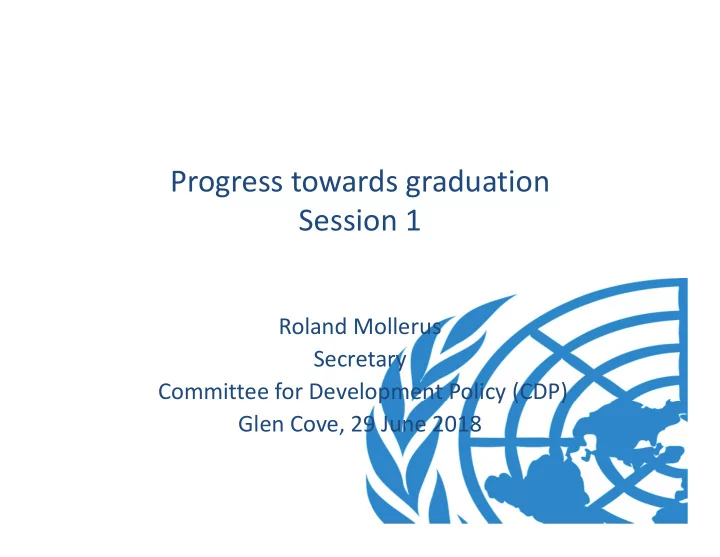

Progress towards graduation Session 1 Roland Mollerus Secretary Committee for Development Policy (CDP) Glen Cove, 29 June 2018
Triennial review results– overview � 12 LDCs meet the graduation criteria – More countries than ever – Far below IPoA target
Graduation – past decisions • Angola and Vanuatu – Scheduled to graduate in 2021 and 2020 • Tuvalu – Recommended by the CDP to graduate in 2012 – ECOSOC will consider (again) this year – CDP restated its recommendation in 2018
Graduation – recommendations (I) • Bhutan, São Tomé and Príncipe and Solomon Islands meet criteria for the second time • Recommended for graduation • Requests from Bhutan and São Tomé and Príncipe for longer transition period
Graduation – recommendations 2018 (II) • Kiribati meets criteria for the third consecutive time • CDP recommends graduation, while acknowledging extreme environmental vulnerability – Kiribati does no longer fulfill the characteristics of an LDC – LDC ‐ specific support measures are not adequately addressing the vulnerability
Graduation – deferred decisions • Nepal and Timor ‐ Leste meet criteria for the second time. • Deferral of decision to recommend to 2021 – Concerns about sustainability of progress of these two countries
Graduation – first eligibility 2018 • Bangladesh , Lao PDR and Myanmar meet the criteria for the first time. • They will be considered for graduation at the 2021 review, with a view to graduating in 2024. • Progress in all three criteria; balanced path to graduation • CDP encourages early planning for graduation by countries and international community
Context: Challenge for graduating countries � LDCs general concern of losing access to ISMs (graduated countries may face reduced support or no longer have access to certain support measures in trade, official development assistance and other areas) � Uncertainty surrounding the loss of ISMs (lack of knowledge) � LDC graduates still face development constraints and challenges (The relative improvement in their situation does not imply that international support is no longer important). Absence of link between results achieved by graduating countries, and incentives to encourage further results � So far, measures put in place by the international community are at best smooth transition measures (a delay in the loss of LDC ‐ specific support, rather than appropriate incentives designed for countries that are no longer going to be LDCs). Opportunity � Identify an assistance package for graduating and recently graduated LDCs, including analytical inputs, advisory services and new forms of concrete development cooperation aimed at smoothing the impact of graduation.
Objectives of the assistance package i) Send a signal to countries that graduation is a positive moment in their development process; ii) Show with concrete assistance that the international community stands ready to support countries to transition to the next level of development and towards achieving the SDGs. Mandate General Assembly resolution A/RES/67/221 has recognized the challenges related to countries which are graduating and has reiterated “[…] the importance of ensuring that the graduation of a country from least developed country status does not cause disruption in the development progress which that country has achieved, and in this regard recognizes that the graduation process of least developed countries should include consideration of appropriate incentives and support measures […]”.
• Opportunities/challenges sustainable graduation • How to cope with phasing out ISMs • Reduce dependence on external support • Development partners focus in preparation of graduation
Roland Mollerus mollerus@un.org
LDC criteria and indicators
Basic eligibility rules I nclusion • • Country meets inclusion thresholds for all three criteria • Country must agree to its inclusion � No country recom m ended for inclusion in 2 0 1 8 Graduation • • Country passes thresholds of any 2 criteria • GNI and HAI ; or • GNI and EVI ; or • HAI and EVI . • Or: Income > twice income graduation threshold • Country must meet criteria at tw o consecutive review s • No automatism: im pact assessm ent, vulnerability profile, country view s taken into account
Application of criteria � Data collected for all 145 UN Member States in developing regions • Most data from UN sources • All data available at cdp.un.org � Thresholds: � GNI per capita (2014 ‐ 2016 average, in $ using Atlas exchange rates) • Inclusion: $1,025 and below • Graduation: $1,230 and above • ‘Income only’ graduation: $2,460 and above � Human assets index • Inclusion: 60 and below • Graduation: 66 and above � Economic vulnerability index • Inclusion: 36 and above • Graduation: 32 and below
Recommend
More recommend